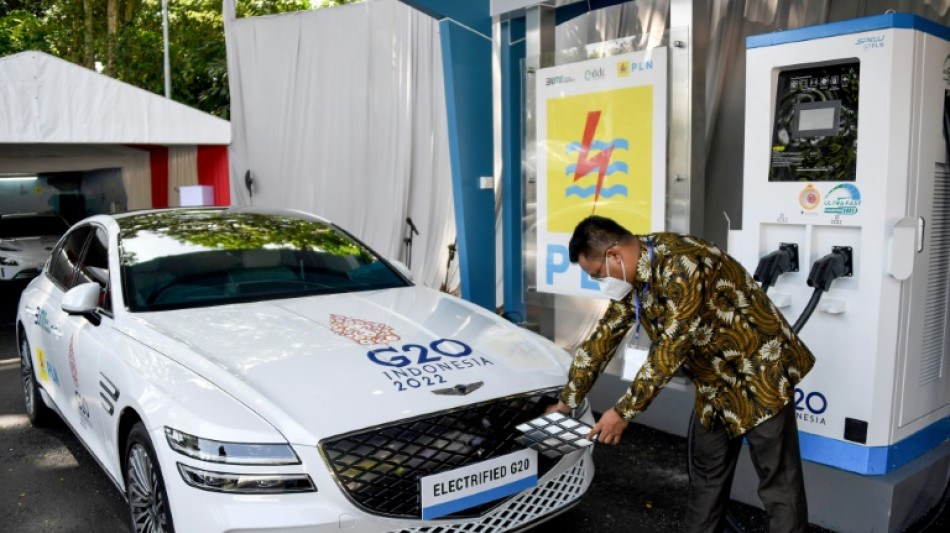
-
 Shubman Gill: Young 'Prince' leading India's post-Rohit, Kohli era
Shubman Gill: Young 'Prince' leading India's post-Rohit, Kohli era
-
Suriname poised for cash inflow from newly discovered oil
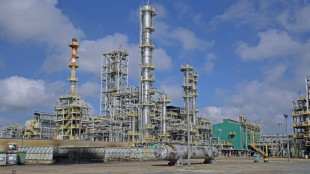
-
 India name Shubman Gill as new Test captain
India name Shubman Gill as new Test captain
-
Russia strikes Kyiv after first stage of major prisoner swap

-
 Growing Arctic military presence worries Finland's reindeer herders
Growing Arctic military presence worries Finland's reindeer herders
-
Venue dispute overshadows CAF Confederation Cup title decider

-
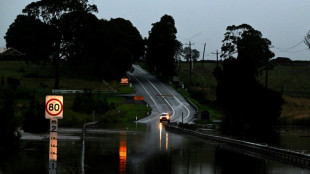 Thousands remain isolated as floods ease in eastern Australia
Thousands remain isolated as floods ease in eastern Australia
-
Rare wild cattle herded in Cambodia by helicopter

-
 Doubt cast on claim of 'hints' of life on faraway planet
Doubt cast on claim of 'hints' of life on faraway planet
-
Japanese filmmaker Fukada casts queasy gaze on J-pop idols

-
 Tennis's 'Big Three' reign unlikely to be repeated: Moya
Tennis's 'Big Three' reign unlikely to be repeated: Moya
-
At Roland Garros, the 'other' clay specialists have their work cut out

-
 Forest chase Champions League dream as Liverpool party
Forest chase Champions League dream as Liverpool party
-
Highlights from Cannes as film festival wraps up

-
 Cannes closes with Iranian, Ukrainian films tipped for glory
Cannes closes with Iranian, Ukrainian films tipped for glory
-
Bae grabs lead but Wang makes charge in Mexican heat

-
 UN chief says Gaza war in 'cruelest phase' as aid trucks looted
UN chief says Gaza war in 'cruelest phase' as aid trucks looted
-
Winger Reece relishes Super Rugby try-scoring record

-
 Griffin and Schmid share lead at Colonial
Griffin and Schmid share lead at Colonial
-
Venezuela opposition leader arrested ahead of tense election

-
 US, Boeing reach deal to resolve MAX criminal case
US, Boeing reach deal to resolve MAX criminal case
-
Anthropic's Claude AI gets smarter -- and mischievious

-
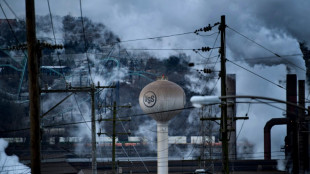 Trump greenlights Nippon Steel 'partnership' with US Steel
Trump greenlights Nippon Steel 'partnership' with US Steel
-
German woman arrested after 17 stabbed at Hamburg station

-
 Napoli back on top in Italy after sealing fourth Serie A crown
Napoli back on top in Italy after sealing fourth Serie A crown
-
'Intense' Bath stay on track for treble with Challenge Cup glory

-
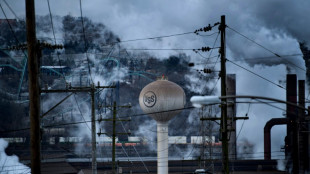 US Steel shares skyrocket after Trump greenlights Nippon 'partnership'
US Steel shares skyrocket after Trump greenlights Nippon 'partnership'
-
Napoli's key men in Serie A title triumph

-
 Bath stay on track for treble with Challenge Cup glory
Bath stay on track for treble with Challenge Cup glory
-
Conte's Napoli future uncertain even after Serie A title glory

-
 McTominay steps out of United's shadow to become Napoli hero
McTominay steps out of United's shadow to become Napoli hero
-
Napoli claim fourth Serie A title as Inter fall short

-
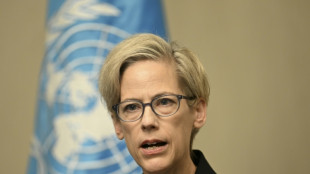 UN expert says Guatemalan anti-corruption fighters persecuted
UN expert says Guatemalan anti-corruption fighters persecuted
-
South Africa rescues all 260 miners stuck underground alive
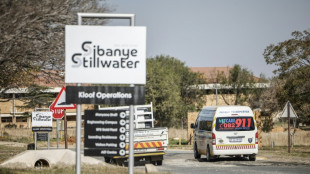
-
 Zimbabwe hundred hero Bennett says Trent Bridge 'war cries' remind him of home
Zimbabwe hundred hero Bennett says Trent Bridge 'war cries' remind him of home
-
Bearman handed 10-place Monaco grid penalty
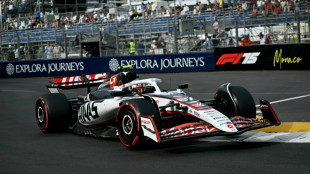
-
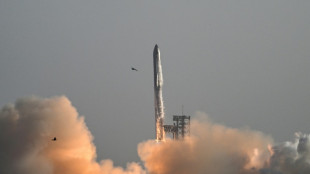 After two setbacks, SpaceX could try to launch massive Starship next week
After two setbacks, SpaceX could try to launch massive Starship next week
-
Billy Joel cancels concert dates over brain condition

-
 Kardashian 'grateful' after Paris robbers convicted
Kardashian 'grateful' after Paris robbers convicted
-
Judge temporarily halts Trump block on foreign students at Harvard

-
 Trump fires new 50% tariff threat at EU, targets smartphones
Trump fires new 50% tariff threat at EU, targets smartphones
-
French-Brazilian photographer Sebastiao Salgado dies aged 81: French Academy of Fine Arts

-
 Arsenal 'humble' but 'all-in' for women's Champions League final
Arsenal 'humble' but 'all-in' for women's Champions League final
-
UN expert calls for end of Gaza blockade in Cannes

-
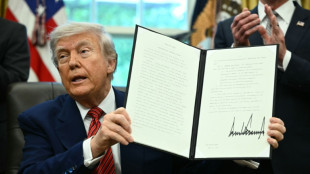 Trump signs orders to boost US nuclear energy
Trump signs orders to boost US nuclear energy
-
US power company to pay $82.5m for California wildfire

-
 Distrusting Argentines loath to bank their 'mattress dollars'
Distrusting Argentines loath to bank their 'mattress dollars'
-
Kishan shines as Hyderabad defeat Bengaluru

-
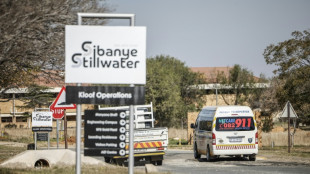 79 miners rescued from S.African shaft, over 100 still underground
79 miners rescued from S.African shaft, over 100 still underground
-
Piastri surprised by Ferrari pace as Leclerc tops Monaco practice


Most automakers fall short on climate goals: report
Only two of the world's 12 top automakers plan to make enough electric vehicles by 2030 to stay in step with Paris Agreement climate goals, experts said Wednesday.
Globally, more than half of all new vehicles coming off of production lines in 2029 would need to be electric for the sector to be compliant with the goal of capping global warming at 1.5 degrees Celsius above preindustrial levels, according to Influence Map, a research NGO that evaluates corporate climate goals and policies.
At the same time, 11 of the 12 carmakers -- while publicly supporting the Paris Agreement -- have actively opposed government policies to accelerate the shift to electric vehicles, especially the phase-out internal combustion engines, Influence Map said.
Japanese auto giants Toyota, Honda and Nissan are especially far off the mark, with non-polluting cars accounting for only 14, 18 and 22 percent, respectively, of their planned production in 2029, the report said.
South Korea's Hyundai, US manufacturer Ford and France's Renault -- with 27, 28 and 31 percent of their global fleets projected to be electric in seven years -- were only marginally more on track.
The standout exception is US-based Tesla, a "pure player" manufacturer that has only ever made electric cars and trucks.
"Almost all automakers are failing to keep pace with the transition to zero emissions," said Influence Map program Manager Ben Youriev.
"Those lagging the furthest behind are also the most negative when it comes to climate policy advocacy."
Ford, Stellantis, Volkswagen and BMW come closer to the 52 percent threshold for compatibility with Paris temperature target, with 36 to 46 percent of their fleets planned to be electric in 2029.
- Stalling progress? -
Besides Tesla, only Mercedes-Benz -- at 56 percent -- is projecting a transition in keeping with that target.
To evaluate automaker trajectories, Influence Map cross-references different datasets.
Researchers used the International Energy Agency's (IEA) scenario for decarbonising the transport sector rapidly enough to not jeopardise the 1.5C goal, which would need 57.5 percent of all cars produced in 2030 to be electric.
The IEA's Net Zero by 2050 report also assumes the share of renewables in global electricity generation would be about 60 percent in 2030.
The Influence Map report then compared this goal with IHS Markit production forecasts to 2029, corresponding to a 52 percent share of electric vehicles in the IEA schema.
Collectively, the combined global production of battery electric vehicles by all automakers is forecast to only reach 32 percent by 2029.
That means the auto industry would need to boost production of zero-emission cars by 80 percent in order to hit the IEA 2030 production target.
The report findings reveal the critical impact of government policy on the pace of the transition away from internal combustion engines, which account for around 16 percent of global energy-related CO2 emissions, according to the UN's Intergovernmental Panel on Climate Change (IPCC).
In the European Union, which aims to cut greenhouse gas emissions to 55 percent below 1990 levels by 2030, Toyota's produced fleet is projected to be 50 percent electric by 2029.
But in the United States, where fuel emissions standards are less stringent, that figure is only four percent.
Similarly, Ford's EU-based production is forecast to be 65 percent electric by 2029 -- nearly double it's global average.
L.Durand--AMWN